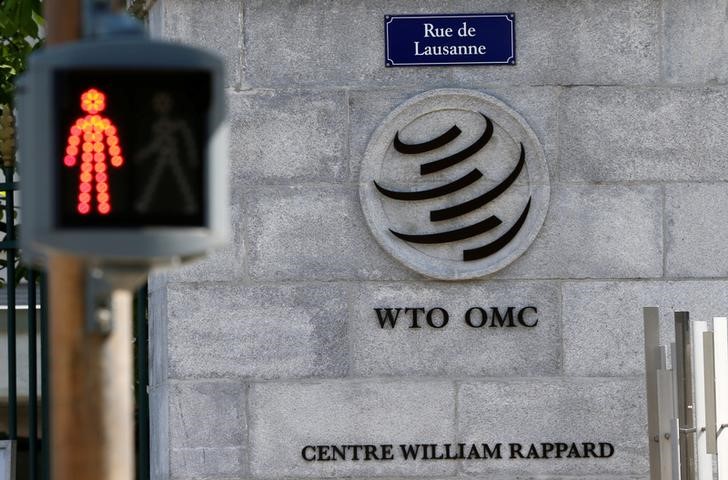(Bloomberg) -- Want to receive this post in your inbox every day? Sign up for the Terms of Trade newsletter, and follow Bloomberg Economics on Twitter for more.
As the Trump administration spikes the football on its “landmark” phase one deal with China, spare a thought this holiday season for the biggest loser: the World Trade Organization.
Last week the U.S. both neutered the WTO’s enforcement process and showed with the China deal that unilateralism can produce faster outcomes for America than the WTO has in decades.
After less than two years of punitive tariffs on some $500 billion worth of goods, the U.S. and China tentatively agreed on a set of policies involving intellectual property, agricultural purchases, financial services and exchange rates. It’s what economists call managed (as opposed to free) trade — whereby one nation imposes specific commitments on another in the form of tariffs, quotas or other restrictions.
But in doing so, the fear is the Trump administration is cementing a return to a pre-WTO era where America achieves its objectives by threatening and imposing penalties on its partners rather than pursuing mutually beneficial trade liberalization at an arbiter like the WTO.
The development poses an existential threat to the WTO as was foreseen by Harvard lecturer Craig VanGrasstek in his 2019 book, “Trade and American Leadership: The Paradoxes of Power and Wealth from Alexander Hamilton to Donald Trump.”
“The most consequential outcome of this dispute may not be which side is ultimately deemed the winner or the loser, or how much short-term damage they do to one another and to third parties in the interim, but the extent to which they each succumb to the temptation to reach a settlement that amounts to managed trade,” he writes. “That would not portend well for the trading system.”
The core reason the WTO exists is because nations in the 1980s were fed up with America’s rampant use of a powerful trade tool — Section 301 of the U.S. Trade Act of 1974.
Section 301 is among the sharpest weapons in the U.S. trade arsenal and was the favored tool used by the Reagan administration to confront Japan’s economic rise when Robert Lighthizer, now the U.S. Trade Representative, was still a fresh-faced deputy trade rep.
In 1994 a group of nations agreed to strike a grand bargain with the U.S. to establish new multilateral commitments on issues like trade in services, foreign investment and intellectual property rights.
In return, the U.S. agreed to submit to a binding dispute-settlement system backed by a panel of trade experts known as the WTO appellate body. For 25 years this system governed a period of mostly peace and prosperity in international trade relations. Lighthizer would argue that the Geneva-based WTO also allowed China’s state-run model into the world economy without playing by a market-based rule book — at the expense of American workers.
Now that period has come to a close.
Just yesterday, with the appellate body dormant, the U.S. moved to appeal an adverse ruling into the legal void and said it will resolve the issue directly with the counterparty — India, in this case.
As a result, there’s nothing stopping world’s largest economies from engaging in escalating tit-for-tat trade wars into 2020 and beyond.
Charting the Trade War
Switzerland is on track to export fewer watches than it has in any year since 1984 as demand for low-end timepieces plunges and the industry increasingly focuses on selling second-hand Rolexes and Patek Philippes.
Today’s Must Reads
- Weighing the costs | The inescapable reality of China’s pledges to purchase $200 billion of American goods is that it may not make up the economic cost of the trade war.
- Stagnant paychecks | Mexican workers doubt that the new Nafta will bring them higher wages despite measures in the deal aimed at reducing the nation’s low-pay advantage.
- Budding industry | Marijuana has been cultivated in Lesotho for centuries. Now it’s a critical piece of the government’s agricultural strategy.
- A Brexit refresher | Britain’s protracted divorce from the EU is moving ahead after Prime Minister Boris Johnson’s election win helped set the new withdrawal date at Jan. 31.
- Stephanomics podcast | Host Stephanie Flanders speaks to a Bloomberg expert about what’s going on in Chile, a usually stable economy that’s seen that image shattered in recent months.
- Japan outlook | A deeper import slump flags concerns on two fronts in the world’s third-largest economy.
- U.K. economy | The latest set of U.K. retail-sales figures may be overstating the weakness.
- Dec. 23: South Korea exports and imports
- Dec. 24: CPB World Trade Monitor
- Dec. 30: U.S. advanced goods trade balance
Don’t keep it to yourself. Colleagues and friends can sign up here. We also publish Balance of Power, a daily briefing on the latest in global politics.
For even more: Subscribe to Bloomberg All Access for full global news coverage and two in-depth daily newsletters, The Bloomberg Open and The Bloomberg Close.
How are we doing? We want to hear what you think about this newsletter. Let our trade tsar know.
